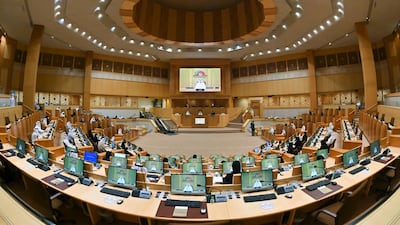The Federal National Council is calling for legal fees to be unified and international legal firms operating in the UAE to hire Emirati lawyers.
The proposed changes would mean a clearer fee structure for people accessing legal services, although lawyers said that imposing a unified model could mean some professionals were being underpaid for their work.
ADebates at the council over the past year involving the Ministry of Justice, lawyers and representatives of the legal profession, led to the proposed changes.
Ghassan El Daye, partner and head of litigation Middle East with the UK-based law firm Charles Russell Speechlys, said a unified structure would not reflect the workload and scope of a lawyer's work.
"It would be inconsistent with the nature of law firms' work, because the estimation of fees vary from one office to another," Mr El Daye said. "The most important of which is the nature of case, the lawyer's experience, the effort and time needed."
Fees in the UAE differ from one lawyer to another with some charging between Dh10,000 and Dh30,000 for handling a case of insulting someone and between Dh50,000 and Dh100,000 in drug-related cases.
Lawyers fees in financial claims can be much higher based on factors such as the length of procedures.
Emirati lawyer Musaab Al Naqbi said unifying legal fees could force lawyers to quit.
Recently established law firms might also resort to hiring unqualified staff to cut down on costs, he said.
"And maybe some law firms will start flouting the rule, which would be a strong blow to the ethics of the profession," Mr Al Naqbi said.
Ali Musabbeh Dhahi, member of the UAE lawyers association board of directors, took part in the discussions at the FNC over the past year.
"We discussed several suggestions ... that were raised by lawyers and the Minister of Justice seemed very responsive to most of our requests during the session," Mr Dhahi said.
“As for unifying fees, we objected to the proposal and clarified that we need a method that regulates the fees issue [but] not unify it.”
On the issue of ensuring Emirati lawyers are hired, Mr Dhahi said one international law firm based in the UAE has no Emiratis among its 700-strong workforce. "The idea behind this is to create more balance," he said.
Mr El Daye said Emiratisation was to be supported but cautioned that a mandatory order might not have the desired effect.
“Making it compulsory needs to be looked at with caution," he said. "Especially [considering] that the country has always emphasised the importance of a genuine Emiratisation.”
A third issue raised was to introduce a single permit card for all courts in the UAE – instead of the four in use today.
To be able to practise law in Abu Dhabi, Dubai and Ras Al Khaimah, lawyers need to obtain cards from the three judicial departments. They also need to get a card from the Ministry of Justice to work in Sharjah, Ajman, Fujairah and Umm Al Quwain.
“Each one has its own requirements and separate fees and of course different expiry dates that are hard to keep track of,” said Emirati lawyer Mohammed Al Redha.
"Each card is valid for a year and it is an exhausting process to renew all of them,” he said.
The ministry-issued card costs Dh1,500 while the three others cost Dh500 each.
"We can have one traffic licence applicable in all emirates; this should be no different.”
The proposals will be discussed further at the FNC before being sent to the ministry for approval.



